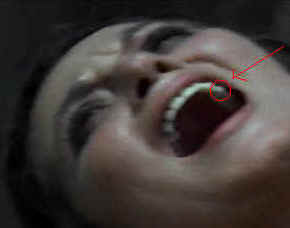Director: Steve Carver

----
The film opens in the midst of a ritual where a Priestess is anointing a young man with streaks of red dye across his forehead, cheeks and chin. Before we can get into trivial details such as where they are, who they are, or what the
heck they are doing, the rite is disrupted by an attack by Roman soldiers. Quickly and mercilessly, the Romans cut down the attendees of the unexplained ceremony; all except the Priestess herself, who is spared because of her beauty, and taken prisoner.
Meanwhile, in another part of the mystery forest (at least I'm assuming it was the same forest, who knows?), a tribe of Nubians are having a party. Like the aforementioned ritual, the viewer doesn't get any details on what exactly is going on, but in the end, the Romans crash their festivities as well. Amid the slaughter of the
natives, the beautiful Mamawi (Pam Grier) is captured.
The soldiers take the prisoners to the town of Brundisium, and they are auctioned off for forty pieces of Egyptian gold to an effeminate nobleman named (appropriately enough), Priscium. Priscium then takes his new acquisitions to the estate of Timarchus, his master. There, the women are instructed that their jobs will be to serve and entertain both the spectators and participants of Timarchus' gladiator extravaganzas.
The problem is, Timarchus' gladiator spectacles are not as popular
as they used to be. It appears that the people of Brundisium have grown bored with the redundancy of two men fighting to the death. The games need something new, something exciting, or Timarchus' cash cow will undoubtedly go belly-up. But what new element could possibly breath life into this stagnant tournament?
Meanwhile, in the kitchen, violence has erupted over a racial slur, and the slaves are turning the place inside out. Chairs, tables and food are strewn everywhere as the women ruthlessly brawl. Coincidentally, while ponderi
ng his gladiatorial dilemma, Timarchus and entourage passes through the kitchen and observes the ferocity of the female combatants. It's there that one of his more observant underlings states that perhaps these savage women might be the very answer to his problem. At this point, you can almost see the small light bulb pop-up over Timarchus' head.
So then, under the careful scrutiny of Septimus, the premier gladiator trainer, the women are taught to fight with swords and spears, as opposed to common kitchen utensils. Perceived as a novel joke, the first female gladiator bout is a success. Even the women seem to be enjoying themselves due to the change of pace from lowly kitchen help to semi-esteemed warriors (I mean, they are still slaves and all). But whe
n the novelty wears thin, and the audience begins to demand blood, the women then realize that life on center-stage of the arena is not a glamorous one.
Though I seriously question this film's historical integrity (and I do mean seriously question), I thoroughly enjoyed it, nonetheless. I found the movie to be very kinetic; the almost continuous action kept my attention throughout the film's entirety. And the few instances where the action did let up were supplemented by either campy acting/dialogue, or gratuitous nudity (not that I was paying attention).
The biggest gripe I had wit
h this film was the contrived ending. As I mentioned before, the Romans really enjoyed the female combat. And it was the bloodthirsty audience which drove Timarchus' first order for Mamawi to finish off one of her opponents. (At first, when the spectacle was considered a joke, the women would fight until the other surrendered, as opposed to the men who fought to the death.) Then suddenly, from out of the blue, when the women revolt at the end and refuse to kill one another, the audience is unexplainably on their side. Were the Romans really that fickle?
The Arena also failed when it came to the Pam Grier factor. Now, whenever I see Pam Grier, I feel that tail-whoopin' should be inherent. Granted, Pam does kick some butt in this movie, but she definitely doesn't fulfill her mandatory tail-whoopin' quota.
----
- In one scene, two of the male gladiators exercise their right to bed one of the slave women on the night before their big fight. One chooses Mamawi, and the other chooses Bodicia (the Priestess). So then we get duel love scenes as we cut back and forth to Mamawi and Bodicia getting their respective grooves on. I was thinking that perhaps this was a ploy by the filmmakers to maximize the amount of flesh we can see in one scene alone. Well, they succeeded.
Be sure to watch carefully during the big revolt scene at the end. When one of the women got stabbed in the back, I swear I distinctly saw fillings in her teeth! I don't remember the Romans as being the innovators of modern dentistry.
- In the aforementioned love scene, Mamawi goes to the room of the gladiator who summoned her (Quintus, a fellow Nubian -- for those keeping score), and immediately upon her entrance, he attacks her. She quickly fights him off (she is Pam Grier, you know) and says, "Quintus, the Romans have taught you to live like an animal, have they also taught you to forget your past?" She slaps him, he looks remorseful for about half a second, then they go at it. My guess is that Mamawi is quick to forgive and forget.


